Related Research Articles
The Sons of the Pioneers are one of the United States' earliest Western singing groups. Known for their vocal performances, their musicianship, and their songwriting, they produced innovative recordings that have inspired many Western music performers and remained popular through the years. Since 1933, through many changes in membership, the Sons of the Pioneers have remained one of the longest-surviving country music vocal groups.

Mary Ford was an American guitarist and vocalist, comprising half of the husband-and-wife musical team Les Paul and Mary Ford. Between 1950 and 1954, the couple had 16 top-ten hits, including "How High the Moon" and "Vaya con Dios", which were number one hits on the Billboard charts. In 1951 alone they sold six million records. With Paul, Ford became one of the early practitioners of multi-tracking.
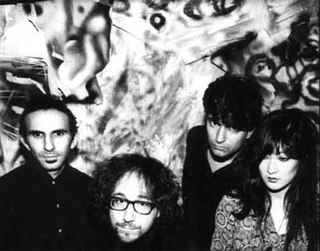
The Fibonaccis were an American art rock band formed in 1981 in Los Angeles. The band consisted of songwriters John Dentino (keyboards) and Ron Stringer (guitar), Magie Song (vocals), Joe Berardi (drums) and later Tom Corey (bass).

New Riders of the Purple Sage is an American country rock band. The group emerged from the psychedelic rock scene in San Francisco in 1969 and its original lineup included several members of the Grateful Dead. The band is sometimes referred to as the New Riders or as NRPS.
"Happy Trails" is a song by Roy Rogers and his wife Dale Evans, known as the theme song for both The Roy Rogers Show on radio and The Roy Rogers Show on television, in which they starred. It was written by Evans and always sung by the duo over the end credits of those programs.
Neil LeVang was an American musician who was best known from television's The Lawrence Welk Show, playing guitar, violin and banjo.
The Palomino Club was a renowned music venue located in the North Hollywood neighborhood of Los Angeles. Established in 1949, it was the most prominent country music club in the city for decades before its closure in 1995. The Los Angeles Times referred to it as "Country Music's most important West Coast club" and it was honored as the national Club of the Year by the Performance magazine. In the late 1980s and 1990s, the Palomino began to feature more rock acts, including many artists associated with SST Records.
Buck Page was an American guitarist and multi-instrumentalist who founded the western band Riders of the Purple Sage, one of three unrelated bands by that name.
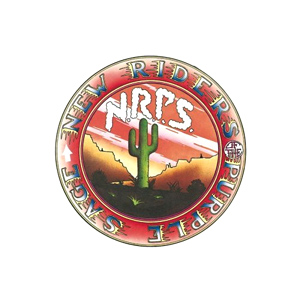
New Riders of the Purple Sage is the debut album by the American country rock band the New Riders of the Purple Sage. It was released by Columbia Records in 1971, and reached number 39 on the Billboard charts.
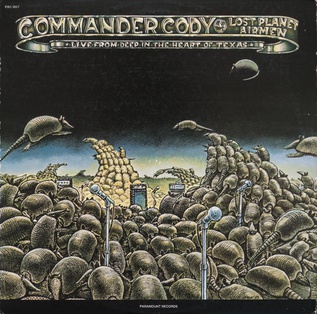
Live from Deep in the Heart of Texas is an album by American rock band Commander Cody and His Lost Planet Airmen. It was recorded live at the Armadillo World Headquarters in Austin, Texas in November 1973, and released in 1974. Unlike many live albums, it contains mostly new material and features only two previously released songs. It reached #105 on the Billboard 200 album sales chart.

John Collins Dawson IV, nicknamed "Marmaduke", was an American musician, singer, and songwriter. He was best known as the leader and co-founder of the country rock band the New Riders of the Purple Sage. He sang lead vocals on most of the band's songs.
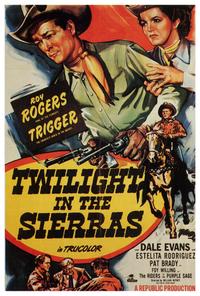
Twilight in the Sierras is a 1950 American Trucolor Western film directed by William Witney and starring Roy Rogers and his horse Trigger, along with Dale Evans, Estelita Rodriguez, and Pat Brady.

Sunset in the West is a 1950 American Trucolor Western film produced by Republic Pictures, directed by William Witney, and starring the "King of the Cowboys" Roy Rogers and his palomino Trigger, promoted as "The Smartest Horse in the Movies". Estelita Rodriguez, Penny Edwards, and veteran character actor Will Wright are among the production’s supporting players.

Spoilers of the Plains is a 1951 American Western film directed by William Witney, and starring Roy Rogers and Penny Edwards, with Foy Willing and the Riders of the Purple Sage. The film was distributed by Republic Pictures.
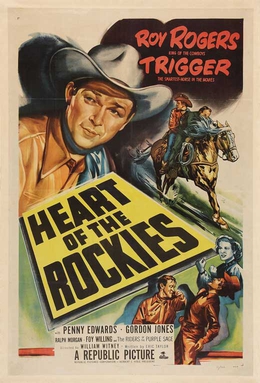
Heart of the Rockies is a 1951 American Western film directed by William Witney and starring Roy Rogers and Penny Edwards. The Rockies are not shown in the film.

The Best of New Riders of the Purple Sage is an album by the country rock band the New Riders of the Purple Sage. It contains a selection of songs that had previously appeared on the band's first seven albums, which were recorded between 1971 and 1975. It was released by Columbia Records in 1976.
I See Hawks In L.A. is an alternative country group from Los Angeles, California founded in 1999 by Rob Waller and brothers Paul and Anthony Lacques with the support of established West Coast country rock bassist David Jackson. Their music incorporates the traditional elements of country music, vocal harmonies and traditional instruments including acoustic guitar and fiddle.
Foy Willing was an American singer, songwriter, musician, and bandleader, who performed Western music and appeared in Western movies. He formed the band Riders of the Purple Sage.

Disc Jockey is a 1951 American film.

Bear's Sonic Journals: Dawn of the New Riders of the Purple Sage is a 5-CD live album by the country rock band the New Riders of the Purple Sage. It was recorded at various venues in the San Francisco Bay Area from August 1969 to June 1970. It was released on January 17, 2020.
References
- 1 2 3 "Cody Bryant and the Riders of the Purple Sage will perform at Redlands Bowl". Los Angeles Daily News . August 28, 2017. Retrieved August 30, 2022.
- ↑ McLellan, Dennis (September 2, 2006). "Buck Page, 84; Singer Founded the Original Riders of the Purple Sage". Los Angeles Times . Retrieved August 30, 2022.
- ↑ Russell, Tony (September 17, 2006). "Buck Page: Founder of the Riders of the Purple Sage". The Guardian . Retrieved August 30, 2022.
- ↑ "All-Star Western Theatre". Radio Archives. Retrieved July 1, 2024.
- ↑ "Buck Page: 1922–2006". Chicago Tribune. September 3, 2006. Retrieved March 28, 2024.
- ↑ Coltman, Bob (2008). Paul Clayton and the folksong revival. Scarecrow Press. p. 137. ISBN 978-0-8108-6132-9.